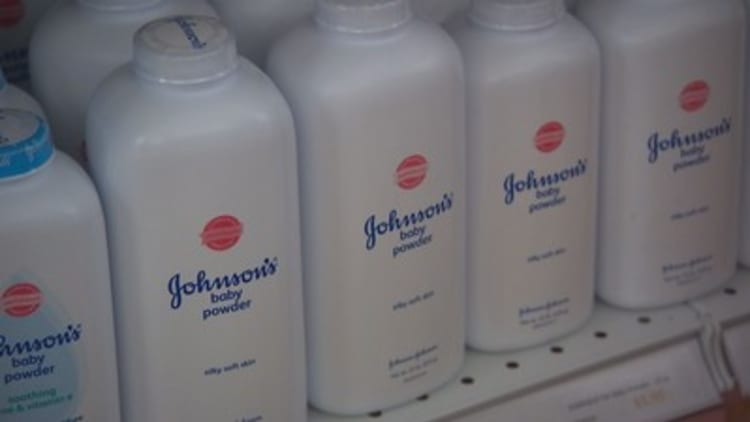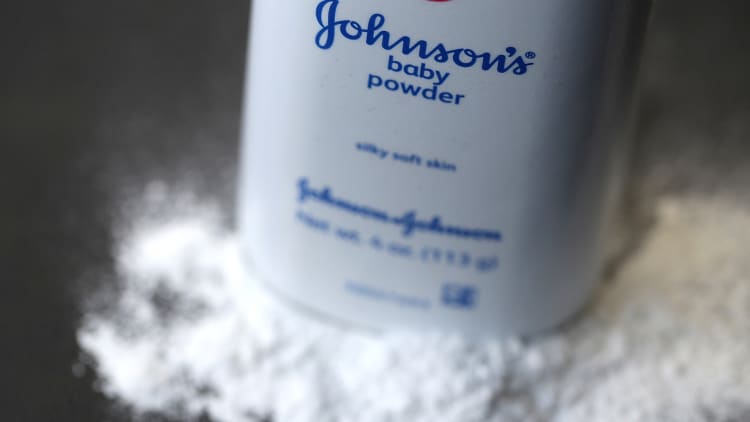
Johnson & Johnson knew for decades that its baby powder contained asbestos, Reuters said in a new report that drove the company's shares down more than 10 percent Friday.
Reuters based its report on a review of documents and deposition and trial testimony. It said the review showed that from 1971 to the early 2000s, J&J executives, mine managers, doctors and lawyers were aware the company's raw talc and finished powders sometimes tested positive for small amounts of asbestos. Those involved discussed the problem but they did not disclose it to regulators or the public, Reuters' examination found.
The company released a statement Friday calling the Reuters article "one-sided, false and inflammatory."
"Simply put, the Reuters story is an absurd conspiracy theory, in that it apparently has spanned over 40 years, orchestrated among generations of global regulators, the world's foremost scientists and universities, leading independent labs, and J&J employees themselves," the company said in a statement.
Reuters stands by its reporting, a spokeswoman told CNBC.
The company has faced thousands of lawsuits alleging its talc baby powder products contain asbestos and caused ovarian and other cancers. Some juries have sided with J&J and others have been unable to reach verdicts. A Missouri jury in July ordered J&J to pay $4.69 billion in a case involving 22 women and their families. A judge affirmed the verdict in August, and J&J vowed to appeal it.
J&J has filed thousands of documents in court proceedings, though most have been designated as confidential.
By Friday's close, J&J stock had fallen 10.04 percent, its worst day in more than a decade, when its shares closed down 15.85 on July 19, 2002. The stock dropped as much as 11.9 percent Friday.

On top of likely being the stock's biggest drop since 2002, the plunge was likely a shock for shareholders used to a boring consumer staple that moves in much steadier increments than the overall market and more volatile stocks. J&J's stock beta over the last five years is 0.72, meaning that it swings much less than the market on a daily basis. A beta of 1 would mean it moves equal to the market and greater than 1 means it is more volatile than the S&P 500.
J.P. Morgan analyst Chris Schott in a note to clients said the price drop Friday was an "over-reaction, especially from a longer-term perspective" because J&J's exposure to the talc legal risk probably won't come close to the roughly $40 billion in market cap J&J lost Friday.
"At the same time, talc does not seem to be an issue that is going to resolve quickly for JNJ and we would expect shares to trade at a lower multiple pending further clarity on the company's exposure to this issue (which could be an extended period of time)," Schott wrote.
J&J has also faced nearly 54,000 lawsuits against its pelvic mesh for allegedly causing injuries and complications. Citi analysts in a note to clients said that despite the large amount of cases, it estimates the total liability has cost J&J roughly $5 billion.
Read J&J's full statement below:
"The Reuters article is one-sided, false and inflammatory. Simply put, the Reuters story is an absurd conspiracy theory, in that it apparently has spanned over 40 years, orchestrated among generations of global regulators, the world's foremost scientists and universities, leading independent labs, and J&J employees themselves.
Johnson & Johnson's baby powder is safe and asbestos-free. Studies of more than 100,000 men and women show that talc does not cause cancer or asbestos-related disease. Thousands of independent tests by regulators and the world's leading labs prove our baby powder has never contained asbestos.
J&J attorneys provided Reuters with hundreds of documents and directly responded to dozens of questions in order to correct misinformation and falsehoods. Notwithstanding this, Reuters repeatedly refused to meet with our representatives to review the facts and refused to incorporate much of the material we provided them.
The Reuters article is wrong in three key areas: The article ignores that thousands of tests by J&J, regulators, leading independent labs, and academic institutions have repeatedly shown that our talc does not contain asbestos. The article ignores that J&J has cooperated fully and openly with the U.S. FDA and other global regulators, providing them with all the information they requested over decades. We have also made our cosmetic talc mines and processed talc available to regulators for testing. Regulators have tested both, and they have always found our talc to be asbestos-free. The article ignores that J&J has always used the most advanced testing methods available to confirm that our cosmetic talc does not contain asbestos. Every method available to test J&J's talc for asbestos has been used by J&J, regulators, or independent experts, and all of these methods have all found that our cosmetic talc is asbestos-free.
Johnson & Johnson will continue to defend the safety of our product. For the truth and facts about talc, please go to www.factsabouttalc.com."
Correction: This article was updated to correct the amount of a Missouri jury award in July. It was $4.69 billion.


